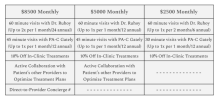wigglethemouse
Senior Member (Voting Rights)
Priced out: Some Long COVID and ME specialists charge high prices for concierge care
Key points you should know:
* Prominent specialists treating complex infection-associated chronic conditions have stopped taking insurance, raised their rates, and/or moved to a concierge model, requiring patients to purchase expensive monthly subscriptions.
* The highest concierge fees range from $5,000 to $8,500 monthly, with treatments billed separately. Despite physicians charging high rates, patients struggle to receive consistent care from providers or affordable referrals when priced out of a specialist’s practice.
* Current health insurance models don’t work well for people with complex conditions — one of many factors that contributes to physician burnout.
* Rising costs and lack of insurance coverage are pushing some patients to digital healthcare platforms and virtual clinics, which also carry subscription fees of more than $1,000 a month.
* Patients priced out of care sometimes self-manage their treatments. A small but growing group of resources exist to help patients identify solutions without providers’ help.
The Sick Times LINK
Key points you should know:
* Prominent specialists treating complex infection-associated chronic conditions have stopped taking insurance, raised their rates, and/or moved to a concierge model, requiring patients to purchase expensive monthly subscriptions.
* The highest concierge fees range from $5,000 to $8,500 monthly, with treatments billed separately. Despite physicians charging high rates, patients struggle to receive consistent care from providers or affordable referrals when priced out of a specialist’s practice.
* Current health insurance models don’t work well for people with complex conditions — one of many factors that contributes to physician burnout.
* Rising costs and lack of insurance coverage are pushing some patients to digital healthcare platforms and virtual clinics, which also carry subscription fees of more than $1,000 a month.
* Patients priced out of care sometimes self-manage their treatments. A small but growing group of resources exist to help patients identify solutions without providers’ help.
The Sick Times LINK
Last edited:

